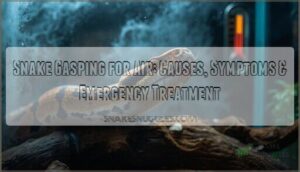This site is supported by our readers. We may earn a commission, at no cost to you, if you purchase through links.

Snakes often refuse food during shedding, breeding season, or simply because they’re picky about prey type.
Most healthy snakes can fast for weeks without concern, but weight loss combined with lethargy signals trouble.
Check your habitat setup first—temperatures should match your species’ needs, and hiding spots reduce stress.
Try different prey sizes or scenting techniques to entice feeding.
However, if your snake hasn’t eaten for over a month while showing other symptoms, it’s time for a vet visit.
The key lies in distinguishing normal behavior from genuine health concerns, which is crucial for identifying potential issues early on and taking appropriate action to ensure the snake’s health and well-being.
Table Of Contents
- Key Takeaways
- Reasons Why Your Snake Isn’t Eating
- Understanding Snake Hunger Cycles
- How Long Can Snakes Go Without Eating?
- Encouraging Your Snake to Eat
- Dealing With a Snake Not Eating for a Month
- Signs of a Hungry Vs. Disinterested Snake
- Overcoming Baby Ball Python Feeding Difficulties
- Frequently Asked Questions (FAQs)
- Why does a snake not eat?
- What should you avoid doing when bitten by a snake?
- Why is my pet snake avoiding food?
- Can a snake be put off by food?
- What to do if my snake doesn’t eat?
- How can I encourage my snake to eat?
- How long can a snake go without eating?
- Is it normal for a snake to not eat for a month?
- How long should I wait if my snake doesn’t eat?
- Can stress from handling affect my snakes appetite?
- Conclusion
Key Takeaways
- Check your habitat first – Wrong temperatures, humidity, or missing hiding spots cause most feeding refusals, so verify that your tank conditions match your snake’s species requirements before worrying about illness.
- Don’t panic over normal fasting – Healthy snakes can go weeks or months without eating during shedding, seasonal changes, or stress, but monitor for weight loss and lethargy as warning signs.
- Try different feeding approaches – Experiment with prey size, warming frozen prey to body temperature, scenting techniques, or changing feeding times to entice picky eaters back to regular meals.
- Seek vet care after a month – If your snake hasn’t eaten for over four weeks while showing other symptoms like discharge or abnormal behavior, it’s time for professional veterinary evaluation.
Reasons Why Your Snake Isn’t Eating
When your snake stops eating, it’s usually telling you something important about its health or environment.
A feeding strike is your snake’s way of communicating something’s wrong—listen to what it’s telling you.
The most common culprits include poor tank conditions, natural seasonal changes, health issues, or simple prey preferences that need addressing.
Poor Health
When your snake won’t eat, snake health issues might be the culprit.
Respiratory infections cause lethargy and snake appetite loss, while parasite infestations disrupt digestion completely.
Mouth rot creates painful swallowing difficulties, and adenovirus infection impairs neurological feeding responses.
Metabolic disorders weaken your snake’s hunger drive too.
Watch for weight loss, discharge, or abnormal behavior—these red flags signal snake illness requiring immediate veterinary attention for proper diagnosis and treatment.
Improper Habitat
While health issues can sideline your snake’s appetite, habitat problems often fly under the radar as major culprits. Your snake enclosure might look perfect, but small environmental missteps can trigger feeding strikes that last weeks.
Temperature gradient issues top the list—snakes need precise thermal zones for proper digestion. Without correct temperature ranges (typically 75-85°F with 88-92°F basking spots), your snake’s metabolism crashes. Poor humidity levels create another roadblock, causing dehydration and shedding complications that suppress appetite.
Substrate choice matters more than you’d think. Cedar shavings can cause respiratory irritation, while inappropriate bedding affects humidity retention. Missing hiding spots create chronic stress, and improper lighting cycles disrupt natural hunting instincts.
Snakes may also refuse food due to underlying stress factors, so minimizing handling before feeding is essential.
Consider these habitat red flags:
- Glass enclosures without visual barriers causing exposure anxiety
- Oversized tanks without clutter creating insecurity
- Inconsistent day/night temperature drops below 70°F
- Bright lighting stressing nocturnal species during feeding time
- Single hide boxes when snakes need warm and cool options
Seasonal Fasting
Why do snakes suddenly stop eating for months? Seasonal fasting is perfectly normal behavior.
Many species enter brumation during winter months, drastically reducing their metabolism. Ball pythons are notorious for refusing food during cooler seasons, while shedding cycles also trigger temporary appetite loss.
Temperature effects and light variations naturally influence feeding patterns, making hibernation-like responses common in captivity. Snakes can even maintain growth due to reduced metabolic rates.
Prey Pickiness
Just like humans have favorite foods, snakes can be incredibly picky eaters.
Your snake might turn its nose up at certain prey options while enthusiastically accepting others.
Prey size matters – too big or small won’t work.
Some snakes prefer live vs. frozen options, while others respond to specific scent preferences or color variations.
If your snake is refusing food, try offering different prey variety like switching from mice to rats, or vice versa.
Sometimes a simple change in presentation or trying pre-killed versus live prey solves your snake feeding issues completely.
Stress from an inappropriate substrate can lead to significant appetite loss.
Understanding Snake Hunger Cycles
Your snake’s feeding schedule isn’t like yours—they naturally fast for weeks or even months without concern.
Understanding these hunger cycles helps you distinguish between normal behavior and genuine feeding problems that need attention, which can be critical for the snake’s health and involves recognizing genuine feeding problems.
Natural Behavior
Understanding your snake’s natural eating patterns can ease your worries about feeding refusals.
Many owners panic when their pet skips meals, but appetite fluctuation is completely normal behavior.
Your snake’s body operates on different cycles than yours, and several natural processes affect their hunger:
- Shedding Cycles: During molting, your snake’s vision becomes cloudy and they feel vulnerable, leading to temporary food refusal lasting 1-2 weeks.
- Brumation Effects: This hibernation-like state triggers seasonal fasts as your snake enters energy-saving mode, especially during cooler months when seasonal changes affect their metabolism.
- Pregnancy Fasting: Gravid females often refuse food as their bodies prioritize egg development over digestion.
Age factors also influence feeding frequency, with adult snakes naturally eating less often than juveniles.
Obesity Concerns
While many snake owners worry when their pet refuses food, overfeeding poses greater health risks than temporary fasting.
Overfeeding Risks include Fatty Liver disease and Metabolic Disorders that can cause Reduced Lifespan by up to 50%.
If your snake not eating coincides with visible weight gain, consider Dietary Adjustments rather than forcing meals—obesity kills more captive snakes than hunger.
Breeding Season
During breeding season, your snake’s appetite might take a backseat to romance.
Here’s what happens:
- Breeding Triggers cause hormonal changes that suppress appetite, especially in females preparing for egg laying
- Mating Behavior redirects energy from feeding to reproductive activities and territory establishment
- Post-Breeding Care demands focus on incubation needs rather than food consumption
This natural fasting helps snakes conserve energy for reproduction.
Observing Behavior
Throughout your snake’s feeding journey, Activity Levels shift dramatically when appetite loss occurs.
Watch for Hiding Behavior changes—snakes often retreat more when stressed or experiencing behavior changes.
Look for Shedding Signs like cloudy eyes or dull skin, which naturally suppress appetite.
Notice their Interaction Style becoming more defensive or withdrawn.
Post-Feeding patterns also matter; healthy snakes typically remain calm after meals.
These stress indicators help you understand why your snake not eating and guide appropriate responses to restore normal snake behavior.
How Long Can Snakes Go Without Eating?
When a snake won’t eat, you’re probably wondering how long they can survive without food.
Snakes possess remarkable fasting abilities that can stretch for months or even over a year in some cases.
Here’s what affects their longterm fasting capacity:
- Species Differences – Ball pythons can survive 18-24 months without food, while smaller species like ratsnakes handle only weeks to months
- Brumation Length – During seasonal fasts, snakes naturally reduce metabolism by up to 80% to conserve energy
- Hydration Importance – Water remains critical; dehydration kills faster than starvation during any food strike
- Age Factors – Adult snakes outlast juveniles due to better fat reserves and slower metabolic rates
However, muscle atrophy and organ damage can occur with extreme fasting, so monitor your snake’s condition closely.
To conserve energy, snakes use metabolic rate reduction.
Encouraging Your Snake to Eat
Once you’ve identified why your snake won’t eat, you can take targeted steps to encourage feeding.
The key is addressing the root cause systematically, whether that’s fixing habitat conditions, trying different prey options, or consulting your veterinarian for health concerns.
Veterinary Consultation
When your snake refuses food for more than two weeks, veterinary care becomes necessary.
An exotic vet specializes in snake health and can identify issues you might miss.
They’ll conduct diagnostic tests like fecal analysis and blood work to pinpoint problems.
Treatment options range from antibiotics to supportive care, depending on findings.
Don’t delay – early intervention prevents serious complications.
Specialist referrals and follow-up care guarantee your snake not eating gets proper attention and preventative care guidance.
Review of Habitat Setup
A snake’s environment can make or break its appetite, so let’s check your tank setup.
Start with the temperature gradient – your snake needs warm basking areas (88-92°F) and cooler zones (75-85°F) for proper digestion.
Humidity levels should stay between 40-60% depending on species.
Check your substrate choice – avoid cedar shavings that cause health issues.
Enclosure size matters too; cramped spaces stress snakes.
Add plenty of hiding spots for security.
When your snake won’t eat, these environmental factors are often the culprit.
Offering Different Prey
Pickiness affects even snakes—your pet might simply dislike their current prey items.
Experimenting with different options often reignites their appetite when traditional mice won’t work.
- Switch prey types: Offer rats instead of mice, or try smaller prey like gerbils
- Adjust prey size: Use appropriately-sized frozen prey that matches your snake’s girth
- Vary feeding schedule: Present live vs. frozen options to determine preferences
Snakes may require specific food products to thrive.
Using Scent Transfer Techniques
When different prey options fail to tempt your snake, scent transfer techniques can trigger their natural hunting instincts. This method works because snakes rely heavily on chemical cues to identify food sources.
| Scent Source | Application Method | Best For |
|---|---|---|
| Fish (salmon, tuna) | Rub directly on prey | Aquatic species |
| Chicken broth | Light coating/dabbing | Reluctant feeders |
| Lizard scent | Transfer from shed skin | Wild-caught snakes |
| Mouse scent | Rub live mouse on prey | Ball pythons |
Simply rub your chosen scent source onto the refused prey item. Fresh scents work best—scent persistence decreases over time.
Understanding natural feeding behaviors can greatly improve feeding success. When handling scents, use gloves to avoid transferring human odors.
This prey scenting approach often succeeds when your snake won’t eat standard offerings, making scent application a valuable tool for snake refusing food situations.
Addressing Presentation Problems
When your snake keeps refusing food despite your best efforts, adjusting prey presentation often solves the problem.
Temperature matters—thawed prey should feel slightly warm to mimic fresh kills, while prey size should match your snake’s girth.
Using the right tools can also be beneficial, like specialized feeding equipment for safe handling.
- Prey Temperature: Warm prey to 98-100°F for ideal scent release
- Prey Movement: Use feeding tongs to create lifelike wiggling motions
- Prey Size: Match prey width to your snake’s thickest body section
- Scent Enhancement: Try "braining" prey or rubbing with chicken broth
- Feeding Time: Offer food during your snake’s natural hunting hours (evening)
Dealing With a Snake Not Eating for a Month
When facing a month-long snake food strike, you’re entering serious territory that demands immediate attention. Extended Fasting beyond four weeks can compromise your snake’s health, especially in juveniles who can’t tolerate prolonged appetite loss causes like adults can.
Start with thorough Weight Monitoring – if your snake’s lost more than 15% of its body weight, that’s a red flag requiring urgent action. Check your setup meticulously: even minor temperature or humidity fluctuations can trigger snake feeding problems.
Implement Hydration Strategies by ensuring fresh water availability, as dehydration compounds fasting stress. Try varied prey presentations – different sizes, scents, or feeding times might break the strike.
However, when your snake wont eat for this duration, Underlying Issues like parasites, respiratory infections, or metabolic disorders are likely culprits. Don’t delay seeking Expert Advice from a reptile veterinarian who can diagnose hidden problems and provide targeted treatment plans.
Signs of a Hungry Vs. Disinterested Snake
You can tell if your snake is genuinely hungry by watching for active hunting behaviors like tongue flicking, exploring the enclosure, and showing interest when you approach with food.
A disinterested snake will remain inactive, hide constantly, and ignore food offerings even when presented correctly, which can indicate that the snake is not hungry.
Health and Husbandry Evaluation
When troubleshooting snake appetite issues, start by examining your husbandry basics like a health inspector.
Temperature gradients, humidity levels, and enclosure size directly impact snake feeding behavior.
| Parameter | Check For |
|---|---|
| Temperature Gradient | 75-85°F ambient, 88-92°F basking |
| Humidity Levels | 40-60% species-appropriate range |
| Hiding Spots | Multiple secure retreats available |
| Substrate Type | Safe, appropriate bedding material |
Poor snake care often explains why your snake’s not eating—it’s usually the environment, not the snake.
Appealing Food and Presentation
When your snake’s appetite seems elusive, smart food presentation can make all the difference.
Try varying prey size, warming prey to body temperature, and using scenting techniques like rubbing with different animals.
Your presentation style matters too—some snakes prefer darkness while others like movement.
| Feeding Techniques | Prey Presentation | Feeding Schedule |
|---|---|---|
| Warm to 98-100°F | Use feeding tongs | Every 7-14 days |
| Scent with mouse/rat | Offer in hiding spot | Consistent timing |
| Pre-killed vs live | Gentle movement | Track feeding response |
Various Feeding Tricks
When conventional feeding methods fail, creative feeding tricks can revive your snake’s appetite.
Try scenting prey with familiar odors, warming prey to body temperature, or braining prey for enhanced scent appeal.
Assist feeding helps stubborn eaters, while live feeding triggers natural hunting instincts.
| Technique | Method | Best For |
|---|---|---|
| Scenting Prey | Rub prey with preferred scent | Picky snake eater |
| Warming Prey | Heat to 98-100°F | Cold-sensitive species |
| Braining Prey | Expose brain tissue | Reluctant feeders |
| Assist Feeding | Gently guide prey into mouth | Weak or sick snakes |
Overcoming Baby Ball Python Feeding Difficulties
Baby ball pythons often struggle with feeding more than adults due to their sensitive nature and specific requirements.
Sensitive babies need extra patience—their feeding success depends on getting every detail right.
You’ll need to address their unique needs through proper husbandry, appropriate prey sizing, and patience during their adjustment period.
Symptoms
When your baby ball python refuses food, several telltale symptoms emerge that signal feeding difficulties. You’ll notice appetite loss accompanied by visible weight changes as their body becomes noticeably thinner.
Lethargy sets in, with your snake showing reduced activity and interest in surroundings. Watch for these critical warning signs:
- Dramatic weight loss with visible spine
- Sunken, hollow-looking eyes
- Loose, wrinkled skin texture
- Fecal abnormalities or absence
Behavioral changes like excessive hiding or skin changes indicate your snake needs immediate attention due to potential health issues.
Cause
Several key factors drive appetite loss causes in baby ball pythons.
Stress Factors dominate – recent shipping, new environments, or excessive handling trigger feeding refusal.
Habitat Issues like incorrect temperatures (need 85-95°F hot side) or humidity (40-70%) suppress appetite.
The Shedding Cycle naturally reduces eating 1-2 weeks before molting.
Illness Indicators including respiratory infections also cause snake eating problems.
Treatment
When your baby ball python won’t eat, swift action can make all the difference.
Here’s your treatment roadmap:
- Perfect the habitat – Maintain 85-95°F hot side, 70-80°F cool side, and 40-70% humidity
- Minimize stress – Reduce handling and provide secure hiding spots for comfort
- Try assist feeding – Use appropriately sized prey with scent transfer techniques
- Seek veterinary help – Consider appetite stimulants, fluid therapy, or supportive care if needed.
Hatchlings typically begin with appropriately sized hopper mice.
Other Health Topics
While treatment addresses immediate feeding concerns, maintaining overall health prevents future problems.
Regular parasite prevention through fecal exams catches infections early. Watch for scale rot from poor humidity and genetic disorders that affect appetite.
Brumation issues can confuse new owners when snakes naturally slow feeding. Monitor for obesity risks from overfeeding.
Schedule snake veterinary visits for persistent appetite loss or concerning snake diseases.
Frequently Asked Questions (FAQs)
Why does a snake not eat?
Your snake’s appetite vanishes for several reasons: stress from environmental changes, incorrect temperature or humidity, shedding cycles, illness, or simply being full from previous meals. Check tank conditions first.
What should you avoid doing when bitten by a snake?
Don’t panic or attempt to suck out venom—this spreads toxins faster.
Avoid ice, alcohol, or tourniquets, which worsen tissue damage.
Don’t try identifying the species yourself; seek immediate medical attention instead.
Why is my pet snake avoiding food?
Your snake might be avoiding food due to shedding, stress, incorrect temperatures, or illness.
Check your tank’s temperature gradient, humidity levels, and hiding spots first.
If you’ve recently handled them or changed their environment, they may need time to adjust before eating again, considering factors like stress.
Can a snake be put off by food?
Notably, 60% of snakes refuse food when stressed by environmental changes.
Yes, your snake can definitely be put off by food due to various factors like improper temperatures, stress, or health issues.
What to do if my snake doesn’t eat?
First, check your tank’s temperature, humidity, and hiding spots.
If everything’s proper, don’t worry—snakes often fast during shedding, stress, or seasonal changes.
Monitor for illness signs and consult a vet if needed.
How can I encourage my snake to eat?
Is your slithery friend being picky?
Check these key factors: make certain proper temperatures (75-85°F), provide hiding spots, minimize handling, verify it’s not shedding.
Offer appropriately-sized prey in a quiet environment.
How long can a snake go without eating?
Healthy adult snakes can survive 2-6 months without eating, though juveniles need food more frequently.
Duration depends on species, age, size, and health status.
Monitor your snake’s weight and behavior closely during extended fasting periods.
Is it normal for a snake to not eat for a month?
Don’t worry—snakes can fast for months! A month without eating is normal, especially during shedding, brumation, or stress. Check tank conditions first, then monitor for illness signs.
How long should I wait if my snake doesn’t eat?
You’ll typically want to wait 1-2 weeks between feeding attempts.
Adult snakes can safely go months without eating, but juveniles need food more frequently.
Monitor your snake’s weight and behavior during this period.
Can stress from handling affect my snakes appetite?
Like a tightly coiled spring, your snake’s stress hormones surge with excessive handling.
Yes, frequent touching dramatically reduces appetite by triggering fight-or-flight responses.
Minimize handling during feeding times—let your serpent settle into comfortable routines for better eating success, as this will help reduce stress.
Conclusion
Remember, patience is a virtue—especially when your snake isn’t eating.
Most feeding refusals stem from normal behaviors like seasonal fasting or habitat stress.
You’ve learned to identify red flags versus natural patterns, adjust environmental conditions, and try various feeding techniques.
When your snake isn’t eating, systematic troubleshooting usually reveals the solution.
However, prolonged appetite loss with concerning symptoms warrants professional veterinary care. Trust your observations and don’t panic over temporary feeding breaks.
- https://www.tandfonline.com/doi/abs/10.1080/17415349.1993.11012529?journalCode=tvnj20
- https://meridian.allenpress.com/jhms/article/18/3/86/137088/Pathology-and-Molecular-Characterization-of-Two
- https://vcahospitals.com/know-your-pet/snakes-problems
- https://familysnake.com/guides/mastering-the-art-of-temperature-control-in-your-snakes-habitat/
- https://www.veterinaryemergencygroup.com/post/my-snake-isn-t-eating-is-it-serious



















